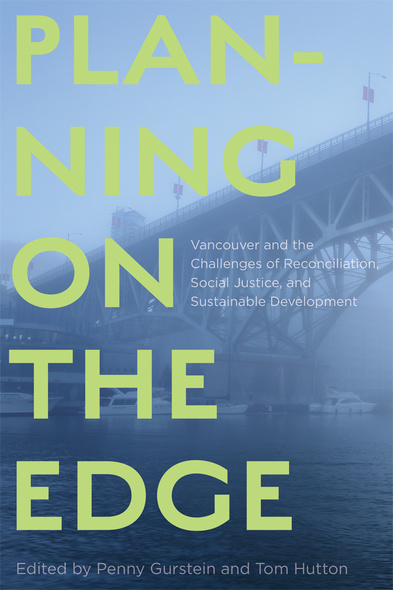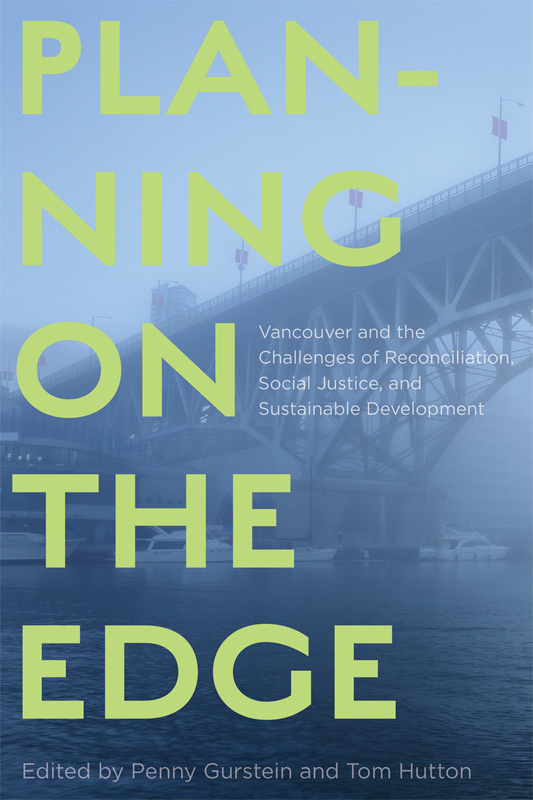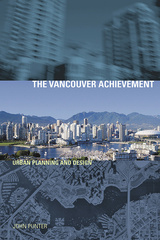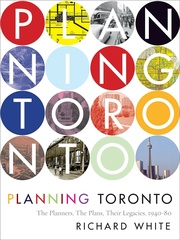
Planning on the Edge
Vancouver and the Challenges of Reconciliation, Social Justice, and Sustainable Development
Vancouver is one of the most intensely studied medium-sized cities in the world and heralded everywhere as a model for sustainable development. In Planning on the Edge, nationally and internationally renowned planning scholars, activists, and Indigenous leaders assess whether the city’s reputation is warranted.
While recognizing the many successes of the “Vancouverism” model, the contributors acknowledge that the forces of globalization and speculative property development have increased social inequality and housing insecurity since the 1980s in the city and the region. To determine the city’s prospects for overcoming these problems, they look at city planning from all angles and perspectives, including planning for the Indigenous population, environmental and disaster planning, housing and migration, and transportation and water management. Together, they provide a comprehensive and integrative profile of Vancouver’s development history and planning record.
By looking at policies at the local, provincial, and federal levels and taking reconciliation with Indigenous peoples into account, Planning on the Edge highlights the kinds of policies and practices needed to reorient Vancouver’s development trajectory along a more environmentally sound and equitable path.
This book will be of interest to scholars and students of urban planning and urban studies, as well as practitioners and activists involved with issues of urban development, sustainability, and social inequality, both in North America and internationally.
This cutting-edge book sheds light on the complex and often contradictory nature that urban planning can assume when it operates within a context where speculative property development has become the new dominant economic sector. It deftly exposes the significant gaps between a discourse of sustainability and realities on the ground.
Vancouver is experiencing many of the same challenges facing cities around the world, including the influx of foreign capital, economic shifts, addressing Indigenous needs, growing polarization, and environmental concerns. The insights contained within this volume will be invaluable to scholars and practitioners around the world grappling with these issues.
Penny Gurstein is a professor and former director of the School of Community and Regional Planning at the University of British Columbia. She is the co-editor of Learning Civil Societies: Shifting Contexts for Democratic Planning and Governance. Tom Hutton is a professor at the Centre for Human Settlements in the School of Community and Regional Planning at the University of British Columbia. His most recent book is Cities and the Cultural Economy.
Contributors: Leonora C. Angeles, Alexander Y. Bigazzi, Stephanie E. Chang, Nathan J. Edelson, Lisi Feng, Lawrence D. Frank, John Friedmann, Howard Grant, Larissa Grant, Jordi Honey-Rosés, Karla Kloepper, Michael Leaf, Timothy L. McDaniels, Jennie Moore, William E. Rees, Leonie Sandercock, Jemma Scoble, Maged Senbel, Olga Shcherbyna, Leona Sparrow, Mark Stevens, Jeremy Stone, Cornelia Sussmann, Andy Yan, Lily Yumagulova
Prologue: Twenty-One Suburbs in Search of a City: A View of the Vancouver Metropolitan Area / John Friedmann
Introduction / Tom Hutton and Penny Gurstein
Part 1: Situating Vancouver in Space and Time
1 Planning since Time Immemorial: Musqueam Perspectives / Howard Grant, Leona Sparrow, Larissa Grant, and Jemma Scoble
2 City on the Edge: Vancouver and Circuits of Capital, Control, and Culture / Tom Hutton
Part 2: Sustainability and Resilience in Metro Vancouver’s Urban Systems
3 Vancouver’s Sustainability Gap and Lessons from the Southeast False Creek Model Sustainable Community / Jennie Moore, Cornelia Sussmann, and William E. Rees
4 Vancouverism and Sustainable Urban Design: Past Its Prime and Needing to Evolve / Maged Senbel and Mark Stevens
5 Transportation: Vancouver the City and Vancouver the Region / Lawrence D. Frank and Alexander Y. Bigazzi
6 Dynamics and Governance of Risk in Metro Vancouver / Stephanie E. Chang, Timothy L. McDaniels, Lily Yumagulova, and Mark Stevens
7 The Sustainability Gap for Water Management in the Vancouver Region / Jordi Honey-Rosés
Part 3: A People-Centred Approach to Planning and Development in Vancouver
8 Beyond the Downtown Eastside: A Regional Perspective on Affordability, Displacement, and Social Justice / Nathan J. Edelson, Penny Gurstein, Karla Kloepper, and Jeremy T. Stone
9 Beyond the Dreams of Avarice? The Past, Present, and Future of Housing in Vancouver’s Planning Legacy / Penny Gurstein and Andy Yan
10 Canada’s Cosmopolis on the Coast: How Immigration Has Shaped and Reshaped Vancouver / Lisi Feng and Michael Leaf
11 Building Civic Capacity in the Shadow of Neoliberalism: Patterns and Challenges in Metro Vancouver’s Immigrant Social Integration / Leonora C. Angeles and Olga Shcherbyna
Epilogue: Beyond Cosmopolis: Dreaming Coexistence as Indigenous Justice / Leonie Sandercock
Index


















